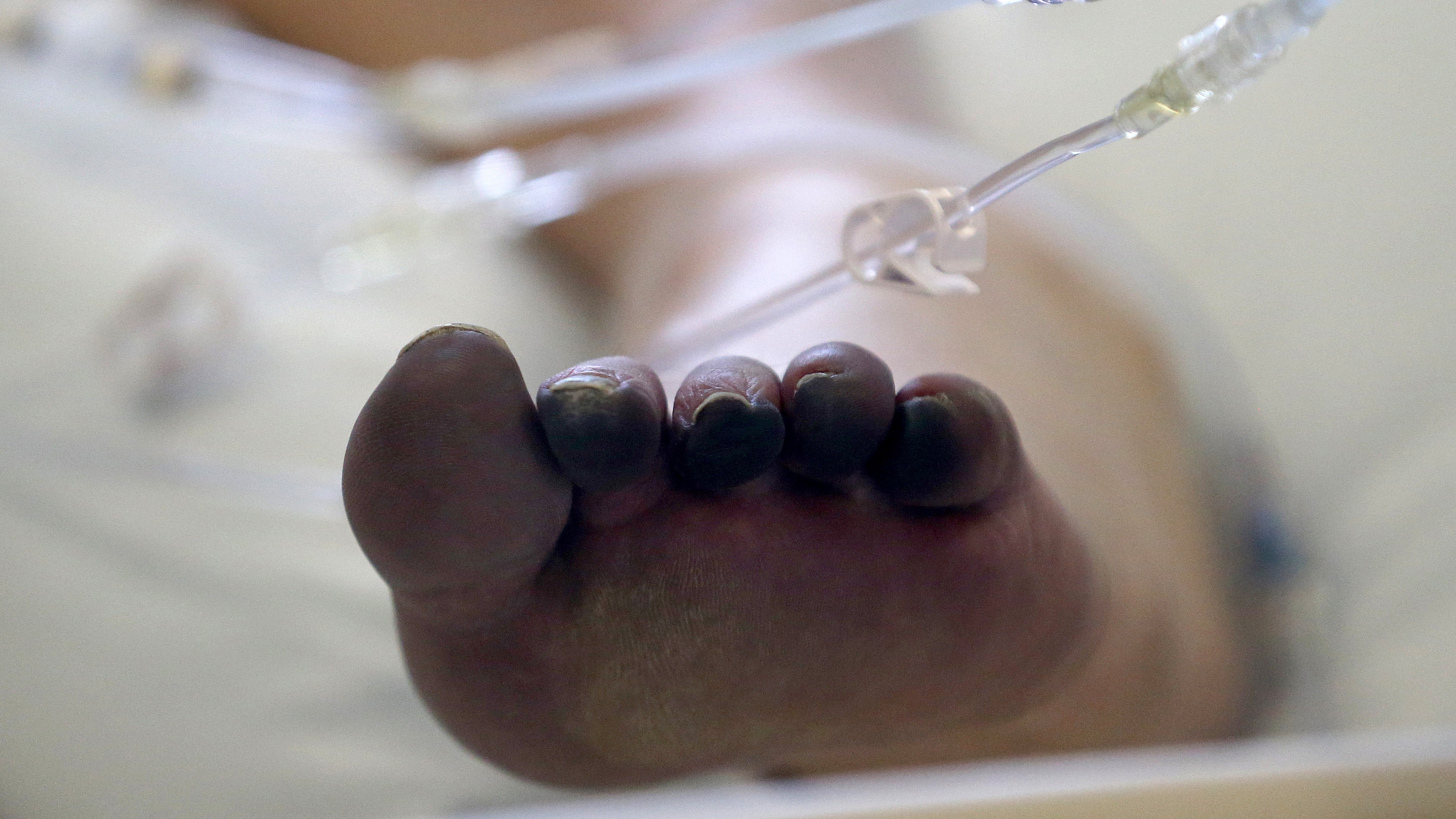Covid toes: why some people are developing chilblain-like lesions
The often painful condition could be caused by the body’s immune response when fighting off Covid-19

A free daily email with the biggest news stories of the day – and the best features from TheWeek.com
You are now subscribed
Your newsletter sign-up was successful
A skin condition known as “Covid toes” – extremely itchy lesions on the hands and feet – could be caused by the body fighting off the virus, scientists say.
The condition usually affects the toes but can also be found on the fingers, causing chilblain-like inflammation and redness, with some people developing painful raised bumps or areas of skin.
Some will have the condition “for months, others for weeks”, said the BBC, with sufferers often presenting with “none of the classic Covid symptoms, such as the persistent cough, fever and loss or change in smell or taste”.
The Week
Escape your echo chamber. Get the facts behind the news, plus analysis from multiple perspectives.

Sign up for The Week's Free Newsletters
From our morning news briefing to a weekly Good News Newsletter, get the best of The Week delivered directly to your inbox.
From our morning news briefing to a weekly Good News Newsletter, get the best of The Week delivered directly to your inbox.
Researchers behind the study, published in the British Journal of Dermatology, examined 50 participants with the condition and 13 with similar chilblain lesions that were initially not linked to Covid-19, “because they occurred long before the pandemic began”.
The study findings suggest “two parts of the immune system may be at play” in developing the condition, and both “involve mechanisms the body uses to fight coronavirus”, explained the broadcaster.
One mechanism involves type I interferon, “a key protein in the antiviral response”, explained The Guardian. The other involved the body “generating an immune response with high levels of certain autoantibodies, which mistakenly target and react with a person’s own cells and tissues as well as the invading virus”, said the paper.
The role of the immune system is just part of the story. Researchers found that cells lining blood vessels supplying the affected area also appeared to play “a critical role” in the development of “Covid toes”.
A free daily email with the biggest news stories of the day – and the best features from TheWeek.com
Last year, in the earlier stages of the pandemic, medical papers in Spain, Belgium and Italy described a “surge” in complaints about painful lesions on patients’ toes, Achilles heels and soles of the feet, reported The New York Times.
At the time, whether the patients were infected with Covid-19 was not clear because many of the affected were “otherwise healthy and testing was limited”, said the paper.
As now, most reported cases were in children, teens or young adults, with some experts positing that the condition may “reflect a healthy immune response to the virus”, said the paper.
The rise of the condition led to concerns that Covid toe was a largely “non-recognised” symptom of Covid-19 infection, said The Guardian. But although the condition was seen frequently during the first wave of the pandemic, it has been much less common in the current Delta variant wave.
According to Dr Veronique Bataille, a consultant dermatologist and spokeswoman for the British Skin Foundation, speaking to the BBC, this could be due to more people being vaccinated or having some protection against Covid from past infections.
“Presentations after vaccination are much rarer,” she said.
She explained that the link is “sometimes not made” between skin problems and Covid-19 infection, as skin conditions can appear weeks after having the virus.
-
 The environmental cost of GLP-1s
The environmental cost of GLP-1sThe explainer Producing the drugs is a dirty process
-
 Greenland’s capital becomes ground zero for the country’s diplomatic straits
Greenland’s capital becomes ground zero for the country’s diplomatic straitsIN THE SPOTLIGHT A flurry of new consular activity in Nuuk shows how important Greenland has become to Europeans’ anxiety about American imperialism
-
 ‘This is something that happens all too often’
‘This is something that happens all too often’Instant Opinion Opinion, comment and editorials of the day
-
 A Nipah virus outbreak in India has brought back Covid-era surveillance
A Nipah virus outbreak in India has brought back Covid-era surveillanceUnder the radar The disease can spread through animals and humans
-
 Covid-19 mRNA vaccines could help fight cancer
Covid-19 mRNA vaccines could help fight cancerUnder the radar They boost the immune system
-
 The new Stratus Covid strain – and why it’s on the rise
The new Stratus Covid strain – and why it’s on the riseThe Explainer ‘No evidence’ new variant is more dangerous or that vaccines won’t work against it, say UK health experts
-
 RFK Jr. vaccine panel advises restricting MMRV shot
RFK Jr. vaccine panel advises restricting MMRV shotSpeed Read The committee voted to restrict access to a childhood vaccine against chickenpox
-
 RFK Jr. scraps Covid shots for pregnant women, kids
RFK Jr. scraps Covid shots for pregnant women, kidsSpeed Read The Health Secretary announced a policy change without informing CDC officials
-
 New FDA chiefs limit Covid-19 shots to elderly, sick
New FDA chiefs limit Covid-19 shots to elderly, sickspeed read The FDA set stricter approval standards for booster shots
-
 RFK Jr.: A new plan for sabotaging vaccines
RFK Jr.: A new plan for sabotaging vaccinesFeature The Health Secretary announced changes to vaccine testing and asks Americans to 'do your own research'
-
 Five years on: How Covid changed everything
Five years on: How Covid changed everythingFeature We seem to have collectively forgotten Covid’s horrors, but they have completely reshaped politics